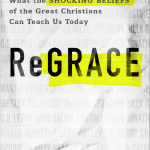(#AmazonAdLink)  My book, (#AmazonAdLink) What is Hell? is now available (#AmazonAdLink) on Amazon. I am doing a series of podcast studies that focus on some of the content from the book. The studies look at the eight key terms that are often equated with hell, and about a dozen key passages that are thought to teach about hell.
My book, (#AmazonAdLink) What is Hell? is now available (#AmazonAdLink) on Amazon. I am doing a series of podcast studies that focus on some of the content from the book. The studies look at the eight key terms that are often equated with hell, and about a dozen key passages that are thought to teach about hell.
If you want to learn the truth about hell and what the Bible actually teaches about hell, make sure you get a copy of my book, (#AmazonAdLink) What is Hell?
Also, if you are part of my discipleship group, there will be an online course about hell as well.
For now, let us discuss the term “Outer Darkness” and see whether or not it refers to hell…

Is “The Outer Darkness” referring to Hell?
There are three passages in Scripture which refer to “the outer darkness” (Gk., to skotos to exōteron) and all three are recorded as teachings of Jesus in the Gospel of Matthew (Matthew 8:12; Matthew 22:13; Matthew 25:30).
In all three instances, the phrase “outer darkness” is further described as being a place of “weeping and gnashing of teeth.”
Due to these descriptive terms, many have equated the outer darkness with hell.
If this were true, however, then it would be impossible for hell to be both a place of burning flame and darkness, for the two are mutually exclusive. One or both of the descriptions must either be figurative or not referring to hell at all.
A careful consideration of each passage that refers to the outer darkness reveals that Jesus was not teaching about hell in these texts, but rather about the initial experience of some Christians at the beginning of the physical reign of Jesus Christ on earth in the future.
In other words, when Jesus physically returns in the future to finally and completely restore justice and peace upon this world, some Christians will not experience His coming with joy, gladness, and celebration, but with regret, grief, and sadness.
They will not experience the initial party of the Wedding Feast of the Lamb, but will instead be left outside in the darkness, because they were not ready for the arrival of their King.
When Jesus returns, He will throw a party full of lights, music, feasting, and dancing. But not all Christians will get to experience this party. Some will be left outside the celebratory circle of lights in the darkness. They will be on the outside looking in.
Such Christians will still have eternal life, and will still enter into the new heavens and the new earth, but they will miss out on the initial inauguration party, and will instead be in the darkness outside the party (the outer darkness).
To see this, let us briefly consider the three texts that refer to the outer darkness.

Matthew 8:12 and the Outer Darkness
The first reference to the outer darkness is in Matthew 8:12, where Jesus teaches that while many from all corners of the earth will sit down with Abraham in the kingdom of heaven, “the sons of the kingdom will be cast into outer darkness” where there will be “weeping and gnashing of teeth.”
Jesus said these things after seeing the great faith of the Gentile centurion, stating that He had not even found such great faith in all of Israel (Matt 8:5-10). So Jesus is contrasting the faith of the centurion with the faith of many of the people of Israel.
The image of people sitting down with Abraham in Matthew 8:11 refers to the kingdom of heaven arriving in all its fullness and glory. While the kingdom of heaven was inaugurated during the first coming of Jesus, it will not fully arrive or be experienced by people on this earth until His second coming.
Jesus is saying that when this future event happens, and the citizens of the kingdom are invited to sit down with Abraham at the celebration feast, it will be people like the Gentile centurion who had great faith that will participate in the celebration.
 There will be other “sons of the kingdom” however, such as many among the Israelite people, who will not participate in the feast. They will instead be in the outer darkness, which simply means that they will be excluded from the light and joy of the inauguration party.
There will be other “sons of the kingdom” however, such as many among the Israelite people, who will not participate in the feast. They will instead be in the outer darkness, which simply means that they will be excluded from the light and joy of the inauguration party.
Note that if Jesus was referring to unregenerate people who were going to spend eternity in hell, He would not have referred to them as “sons of the kingdom.” The “sons of the kingdom” are those who are members and citizens of the kingdom.
But the fact that the “sons of the kingdom” are in the outer darkness does not mean that they lose eternal life and spend eternity in hell, but that they miss out on the initial celebration at the full arrival of God’s rule and reign on earth.
Some “sons of the kingdom” fail to participate in this party because they did not have the right beliefs and behaviors to warrant a seat at the table. They will instead stand outside the glow of the joyful celebration, watching from the darkness with profound regret and shame for how they lived their life on earth.
Hell is not in view in Matthew 8:12, but rather describes the experience of some Christians who miss out on the initial inauguration party when Jesus returns to rule and reign on earth.
Matthew 22:13 and the Outer Darkness
The second reference to the outer darkness is found in Matthew 22:13. This text makes it clear that the reference to outer darkness has exclusion from the Wedding Feast in view rather than hell, for Jesus specifically tells a parable about who gets to participate in this future celebration.
In the Parable of the Wedding Feast (Matt 22:1-14), many people are initially invited to the celebration, but are too busy to attend. So the king sends out his servants into the highways to invite anyone and everyone they find.
As a result, many people attend the feast, both good and bad. Yet one man shows up at the feast who is not wearing a wedding garment, and so the king has him thrown out of the party into the outer darkness, where there is weeping and gnashing of teeth.
Some have wondered how the man should have known what to wear to the wedding celebration, or if he was poor, how he could have afforded the proper attire.
But many scholars point out that it was a common practice in the Middle-Eastern and Mediterranean cultures for the host to provide proper garments for the guests (cf. Judg 14:12). So regardless of this man’s background or social position, he would have been provided with a garment to wear into the celebration.
But for some reason, the man did not put on the clothing he had been given. He came wearing his own clothes. He thought the clothes he had on were just fine, and that he didn’t need the clothes provided to him by the king.
Yet he was wrong, and so he is removed from the celebration, and sent outside, away from the lights and feasting of the party, where he experiences shame and regret.
The fact that this man is at the wedding feast proves that he is a genuine believer, for only believers are welcomed into the feast.
If he was an unbeliever, then how did he get into the wedding celebration in the first place? He could not have even entered. Therefore, he is a believer, which granted him access to the feast.
But he didn’t come wearing the proper clothing, and so he is removed from the feast. His removal from the feast is not a removal from heaven and eternal life so that he ends up in hell, but is simply a disciplinary process in which the man is not allowed to participate in the inauguration celebration.
So what is symbolized by the man’s lack of proper clothing? As Gregory Sapaugh writes,
The wedding garment is a figure for righteous living. Therefore, this man did not faithfully perform the good works that are necessary to be present at the wedding banquet. … Eternal salvation is not an issue in this passage.
The man represents a person who believes in Jesus for eternal life, but who fails to put on the righteous garments that God provides, and instead lives selfishly and sinfully throughout their life. Such a person still has eternal life, but they might miss out on the initial inauguration banquet when Jesus returns and sets up His earthly kingdom.
In his book, (#AmazonAdLink) The Skeletons in God’s Closet, Joshua Ryan Butler argues similarly:
When the King shows up, the prodigals and prostitutes are running into the kingdom while the self-righteous and self-made are weeping outside the party. The sick, poor, blind, and lame are partying it up at God’s Wedding Feast while those who thought their own clothes were good enough are cast out into the darkness.
Here again, the outer darkness is not hell, but instead describes the initial experience of some unfaithful Christians at the beginning of the future rule and reign of Jesus Christ at His second coming.
The second coming of Jesus Christ will begin with a great time of celebration. But those who did not look for the return of Jesus, or prepare for it with their lives, will miss out on the joy and excitement of this event.
Like Scrooge in “The Christmas Carol” who stands in the cold and darkness out in the street while he peers through the window at a happy and warm Christmas celebration inside, some Christians will only be able to watch the party from the darkness outside. Scrooge missed out on the celebration because of his behavior, and so will some Christians. Such a person is represented in this parable by the man who attends the feast without the proper garments.
In the book, (#AmazonAdLink) What is the Outer Darkness?, Zane Hodges said this:
Matthew 22 doesn’t say there were a bunch of torturers out there in the darkness who suddenly take this poor man who is tied up hand and foot and start torturing him. The imagery is one of exclusion and limitation on activity. That’s what being tied hand and foot means. [He] can’t really do anything. Exclusion from the lighted banqueting hall is a synonym for co-reigning with Jesus Christ.
Matthew 25:30 and the Outer Darkness
The third and final reference to the outer darkness is found in Matthew 25:30, near the end of the Parable of the Talents (Matthew 25:14-30).
Most Bible teachers believe that the Parable of the Talents refers to God’s gifts to believers, and our responsibility to use those gifts wisely in this life. If this view is correct, then the experience of the unprofitable servant at the end of the story can be understood in a similar way as seen in both Matthew 8:12 and 22:13.
 As in both of those previous situations, the unprofitable servant of Matthew 25:30 would represent a believer who failed to live as God wanted and desired during this life, and so is cast into the outer darkness during the initial stage of the earthly reign of Jesus. Rather than experience the joy of this celebration, they only experience regret for how they lived their life and shame for missing out on the greatest celebration in all of celestial history.
As in both of those previous situations, the unprofitable servant of Matthew 25:30 would represent a believer who failed to live as God wanted and desired during this life, and so is cast into the outer darkness during the initial stage of the earthly reign of Jesus. Rather than experience the joy of this celebration, they only experience regret for how they lived their life and shame for missing out on the greatest celebration in all of celestial history.
However, I think there is a better way of understanding the Parable of the Talents. I have written about this elsewhere, but let me summarize the view for you here.
Though many assume that the Parable of the Talents describes the return of Jesus and how He judges Christians at His return, this is not what Jesus says.
While most Bible translations do include the words “the kingdom of heaven” in Matthew 25:14, these words have been added by the translators and do not exist in the Greek. Jesus is describing the kingdom of heaven in the preceding parable, the Parable of the Wise and Foolish Virgins (Matthew 25:1-13), as well as in the following parable, the Parable of the Sheep and the Goats (Matthew 25:31-46), but He is not describing the final arrival of the kingdom of heaven in the Parable of the Talents.
Instead, this middle parable is a contrast with the other two, in which Jesus shows His followers what life will be like for them if they try to live in the kingdom of this world.
Numerous lines of evidence support this view. Chief among them is the fact that the actions of this man who travels to a far country would have been understood as quite evil in the first century Mediterranean world. They not only closely follow the actions and behaviors of King Herod and how he went to Rome to become the king of Israel, but the values of this man also reveal the opposite of what Jesus taught and encouraged.
The first century Mediterranean world was guided by the cultural values of honor and shame. Modern western culture is guided by materialism. Today, we value any activity which gets more money and gains more possessions.
Yet in an honor-shame culture, such activities were great sins. They believed that money and possessions were zero-sum commodities, which meant that the only way for one person to gain more money and possessions was by taking it away from someone else. This was very shameful behavior. “Anyone who suddenly acquired something ‘more’ was automatically judged to be a thief” (John Pilch, (#AmazonAdLink) The Cultural World of Jesus, 164).
Therefore, in light of these cultural values about money, the first two servants, like their master, were exploiters. This means that “from the peasant point of view … it was the third slave who acted honorably, especially since he refused to participate in the rapacious schemes of the greedy, rich man” (Malina and Rohrbaugh, (#AmazonAdLink) Social-Science Commentary on the Synoptic Gospels, 125).
So Jesus is saying that if one of his disciples does not look with anticipation for the coming of the kingdom of heaven, their only other option is to participate with the kingdom of this world, by imitating its greedy ways.
If a person does not follow the way of Jesus, they will either behave very shamefully in stealing from their brethren, or will receive harsh judgment and punishment from the rulers of this world for not participating in their greedy game.
The rulers of this world expect and demand their subjects to follow their twisted, thieving ways to enrich themselves at the expense of others. Those who refuse to follow these marching orders will be punished by the rulers, and will be banished to the edges of society and culture.
But when followers of Jesus experience such treatment at the hands of the rulers of this world, they should not despair, for the punishment of worldly rulers is not the end of the matter.
So in this interpretation, the Parable of the Talents is not about the second return of Jesus, but about life in this world now and the two ways that people can live.
If we help the rulers steal from others, we ourselves will gain recognition and reward from those greedy rulers. But if we refuse to play their evil game, we will gain only condemnation from them, and they will even steal from us what we have and give it to others who do not need it. But Jesus surrounds this parable with two others about what it looks like to live life in light of the kingdom of heaven.
Zacchaeus is the perfect example of the two kingdoms at work.
Indeed, the Parable of the Talents in Luke 19:11-27 immediately follows the story of Zacchaeus. Prior to meeting Jesus, Zacchaeus operated according to the principles of the kingdom of this world and became very rich as a result. Yet his actions were extremely shameful as he stole from the poor to gain wealth for himself.
So when Zacchaeus started to follow Jesus, he adopted a new set of values and behaviors, which caused him to give away all of his accumulated wealth. His new behavior, however, likely cost him many rich friends, powerful politicians, and invitations to fancy parties. He also likely lost his job, and along with it, his house, servants, possessions, and status in Roman society.
Those who continued to live within that system likely looked upon Zacchaeus’ new behavior with shock and disdain, thinking that he would eventually regret his decisions.
This is also what the lord of the servants in Matthew 25:14-30 thinks of his unprofitable servant.
The rich landowner commands that the man be cast out into outer darkness where there is weeping and gnashing of teeth (Matthew 25:30). This is not a reference to hell, and in this case, is also not a reference to Christians missing out on the Wedding Feast of the Lamb.
Here, the imagery represents the perspective of the rich lord. Since the third servant didn’t use his talent to steal from others, nor did he even gain usury with the bankers (Matthew 25:27), this servant can no longer join the human party where there is light, laughter, feasting, and dancing.
Instead, he is sent out of the palace into the dark alleyways where there is only poverty and problems. In Matthew 25:30, the master is essentially saying, “Since this servant didn’t play by my rules, he doesn’t get to enjoy the privileges of my household. Kick him out into the street where he will experience profound regret that he didn’t do what I wanted. He passed up the deal of a lifetime, and will live to regret it.”
But this is not the end of the story.
Jesus now goes on in the final parable of Matthew 25 to show His disciples that even though they might be rejected by the kingdoms of men and miss out on the parties of men, they will not be rejected or despised by the kingdom of God.
Since the values and behaviors of the two kingdoms are diametrically opposed to one another, the consequences for actions are different as well.
While a lack of greed brought punishment from the kingdoms of the world, this same behavior brings praise and honor in the kingdom of heaven. With the Parable of the Sheep and the Goats (Matthew 25:31-46), Jesus shows the distinctive characteristics that separate the two kingdoms, and calls His disciples to choose which kingdom they will serve.
The parables represent the choice Jesus laid out earlier in His career, when He stated that no man can serve both God and money (Matthew 6:24).
So once again, the outer darkness does not refer to hell, nor does the accompanying description of weeping and gnashing of teeth.
 Instead, both terms are symbolic ways of referring to “missing out on the party” and “expressing profound shame and regret” as a result. It is an image of loss. The phrase “weeping and gnashing of teeth is an oriental term for extreme sorrow” (Hodges, (#AmazonAdLink) What is the Outer Darkness?, 50).
Instead, both terms are symbolic ways of referring to “missing out on the party” and “expressing profound shame and regret” as a result. It is an image of loss. The phrase “weeping and gnashing of teeth is an oriental term for extreme sorrow” (Hodges, (#AmazonAdLink) What is the Outer Darkness?, 50).
The imagery can be used of believers missing out on the inauguration ceremony of the kingdom of heaven when Jesus returns to rule and reign on earth, but it can also be used of the experience of believers who get neglected and forsaken on this earth by worldly rulers for not living according to the rules of the kingdom of this world.
But those who miss out on the party here on this earth now can expect to enjoy a better party when Jesus returns.
The truth that Jesus reveals is that believers will experience outer darkness in one form or another. If we seek the praise of kings and the riches of men now, we will lose out on such things when Jesus returns.
If, however, we seek first the kingdom of God and His righteousness (Matthew 6:33), then while we might be reviled and hated by men now, we will receive a warm and rich welcome by Jesus when He returns to rule and reign.
So what is the Outer Darkness?
So what is the outer darkness, and why is it described as a place of weeping and gnashing of teeth?
The outer darkness is a term which describes the place of darkness outside the lights of a party or celebration. It can describe our experience here on earth when we do not live according to the ways and rules of this world, and it can also describe the experience of some Christians at the beginning of the next life if they do not live according to the rules and ways of Jesus.
If Christians do not live in light of the kingdom of heaven, and so experience the outer darkness at His return instead of the inner light of the party, this does not mean they will spend eternity in hell.
They still have eternal life, and they will still participate in the eternal rule and reign of Jesus Christ on earth and throughout the universe, but they will miss out on the initial inauguration celebration when Jesus sets up His throne on earth.
The people who miss out on this party experience profound shame and regret. They miss out on the party of the ages!
So they weep and gnash their teeth in shame and disappointment at how they lived their life here on earth before Jesus returned. The phrase “weeping and gnashing of teeth” is not a description of suffering torment in hell, but is a Middle-Eastern idiom describing the expression of sorrow and lament for missing out on a great blessing or opportunity.
The people who weep and gnash their teeth at the return of Jesus do so because they are in the darkness outside the lights of the party, looking in at the great joy and celebration taking place inside, knowing that if they had just lived with greater obedience and expectation, they could have been participating in the party as well.
Such sadness will not last forever, of course. For after the Wedding Feast of the Lamb (Rev 19:6-9), every tear will be wiped away (Rev 21:4) so that all children of God will be welcome to participate in the never-ending joy and peace of the new heavens and new earth, where there will be no more death, sorrow, mourning, or pain.
So the outer darkness does not refer to hell.
There are no passages in Scripture which describe hell as a place of darkness where people are tormented for eternity as they wail and gnash their teeth. Jesus’ teachings on the outer darkness are a warning for believers to watch how we live our lives now, looking for the soon and blessed return of our Lord and Savior Jesus Christ.
 Do you have more questions about hell? Are you afraid of going to hell? Do want to know what the Bible teaches about hell? Take my course "What is Hell?" to learn the truth about hell and how to avoid hell.
This course costs $297, but when you join the Discipleship group, you can to take the entire course for free.
Do you have more questions about hell? Are you afraid of going to hell? Do want to know what the Bible teaches about hell? Take my course "What is Hell?" to learn the truth about hell and how to avoid hell.
This course costs $297, but when you join the Discipleship group, you can to take the entire course for free.




 The word gehenna is a Greek transliteration from the Hebrew “Valley of Hinnom” (or Ge-Hinnom) which was a deep gorge to the southwest of Jerusalem. It was also called the Valley of Tophet.
The word gehenna is a Greek transliteration from the Hebrew “Valley of Hinnom” (or Ge-Hinnom) which was a deep gorge to the southwest of Jerusalem. It was also called the Valley of Tophet. As you haul your cart of trash down the hill into the valley, you first become aware of the smoke that rises continually from the dump. It is acrid and oily from the burning trash and causes your eyes to smart.
As you haul your cart of trash down the hill into the valley, you first become aware of the smoke that rises continually from the dump. It is acrid and oily from the burning trash and causes your eyes to smart.
 It should be left as it is, thereby alerting the reader to the fact that the text is referring to the valley called Gehenna outside the gates of Jerusalem. Translating it as “the Valley of Hinnom” would also be fine.
It should be left as it is, thereby alerting the reader to the fact that the text is referring to the valley called Gehenna outside the gates of Jerusalem. Translating it as “the Valley of Hinnom” would also be fine. Jesus uses the history and imagery of this place to warn His disciples about what can befall them in this life if they do not follow His teaching and take steps (sometimes drastic) to protect themselves and their loved ones from the devastation of sin.
Jesus uses the history and imagery of this place to warn His disciples about what can befall them in this life if they do not follow His teaching and take steps (sometimes drastic) to protect themselves and their loved ones from the devastation of sin.
 Since it is not a place only for wicked and evil people, for even the righteous go to sheol, it cannot be equivalent to the modern concept of hell. Some teach, therefore, that sheol was a special “holding tank” or “intermediate state” for all people who lived and died prior to the death and resurrection of Jesus, and that after the resurrection of Jesus, people no longer go to sheol, but are immediately sent to either heaven or hell.
Since it is not a place only for wicked and evil people, for even the righteous go to sheol, it cannot be equivalent to the modern concept of hell. Some teach, therefore, that sheol was a special “holding tank” or “intermediate state” for all people who lived and died prior to the death and resurrection of Jesus, and that after the resurrection of Jesus, people no longer go to sheol, but are immediately sent to either heaven or hell.





 Millions of Christians have questions about church and how to find true Christian fellowship. In this podcast interview, Richard Jacobson and Jeremy Myers discuss how to be the church and why Hebrews 10:25 does not teach that all Christians must attend a church service on Sunday morning.
Millions of Christians have questions about church and how to find true Christian fellowship. In this podcast interview, Richard Jacobson and Jeremy Myers discuss how to be the church and why Hebrews 10:25 does not teach that all Christians must attend a church service on Sunday morning.